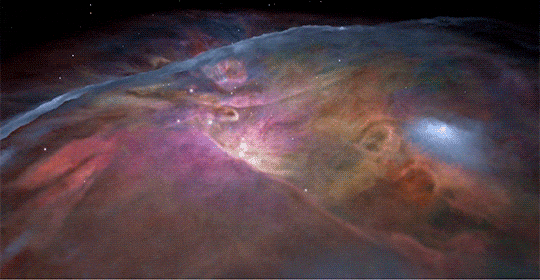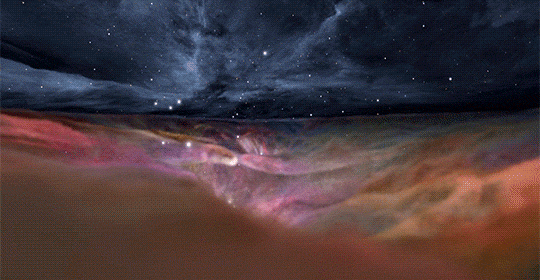Your personal Tumblr journey starts here
Orion Nebula - Blog Posts

2023 October 10
Hidden Orion from Webb Image Credit & License: NASA, ESA, CSA, JWST; Processing: M. McCaughrean & S. Pearson
Explanation: The Great Nebula in Orion has hidden stars. To the unaided eye in visible light, it appears as a small fuzzy patch in the constellation of Orion. But this image was taken by the Webb Space Telescope in a representative-color composite of red and very near infrared light. It confirms with impressive detail that the Orion Nebula is a busy neighborhood of young stars, hot gas, and dark dust. The rollover image shows the same image in representative colors further into the near infrared. The power behind much of the Orion Nebula (M42) is the Trapezium - a cluster of bright stars near the nebula’s center. The diffuse and filamentary glow surrounding the bright stars is mostly heated interstellar dust. Detailed inspection of these images shows an unexpectedly large number of Jupiter-Mass Binary Objects (JuMBOs), pairs of Jupiter-mass objects which might give a clue to how stars are forming. The whole Orion Nebula cloud complex, which includes the Horsehead Nebula, will slowly disperse over the next few million years.
∞ Source: apod.nasa.gov/apod/ap231010.html

Wild Orion.
Credit: Tony and Daphne Hallas

Thousands of Stars in the Orion Nebula
Close inspection of the 2006 Hubble Space Telescope color mosaic of the Orion Nebula (M42) reveals numerous treasures that reside within the nearby, intense star- forming region. Southwest of the Trapezium stars located in the center of the nebula, a stunning Hubble Heritage portrait captures a variety of intricate objects. Deeply contrasting areas of light and dark blend with a palette of colors mix to form rich swirls and fluid motions that would make even the best artists stand back and admire their work.
Visible slightly bottom right center is the star LL Orionis (LL Ori), originally release by the Hubble Heritage Project in 2002. The delicate bow shock that surrounds LL Ori points towards the stream of gas flowing slowly away from the center of the Orion Nebula, near the Trapezium stars located off the image to the upper left. Close examination of the ends of the bow shock show secondary shocks that are formed as a two-sided jet of gas flowing away from this forming star at high velocity strikes the stream of low velocity gas from the center. To the right of LL Ori, a ghostly veil of material hangs thick and dark, obscuring portions of the nebula behind it.
Credit: NASA/Hubble
I'm back + more space photos
Haven't posted in a few months, mainly because I was busy w/ school, but I also just haven't been using tumblr that much. I do want to start posting more, but I also kinda doubt I will ever consistently post. Anyways, here are some space photos that I took in november.
The Orion Nebula



The brighter images are blurry because they have to capture light for a longer time. This can be solved with a tracking mount, but I do not have one


These were taken from farther away, which makes them look clearer
The Pleiades



The brightest stars in this cluster can be seen with the naked eye, but the dimmer/further ones can only be seen through cameras/telescopes
Jupiter



You can kinda see its stripes on the dimmer photos, but its not very clear. With the brighter one, you can see its 4 Galilean moons next to it. When looking through a telescope with the naked eye, you can see both the stripes and the moon, but that's harder to capture on camera.
The moon


Not much to say, just a few photos of our moon.
I'll try to take more photos over winter break, but its kinda annoying to deal with things like bugs and neighborhood lights.
Photos of The Orion Nebula that I took over the past few nights. I took these without a phone adapter (it's arriving on Tuesday), so they turned out surprisingly well




The first photo is orange because of the glare from a nearby light, the rest were taken in a different location and are slightly blue because it was dawn.
Edited versions of those photos:


Telescope: skywatcher heritage 150p tabletop dobsonian
Eyepiece: 25mm
Camera: Samsung Galaxy A14 camera - ISO 3200, speed 4 or 8 seconds

This is my first shot of Orion Nebula from home (Nice, France) on Nov 14th. Taken with C8 EdgeHD, Nikon D750, ISO6400,10s. My next step is to fine tune my mount tracking (was done in a rush), take longer exposures and stack several shots. Hopefully this week-end.





